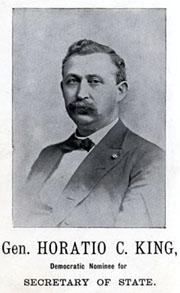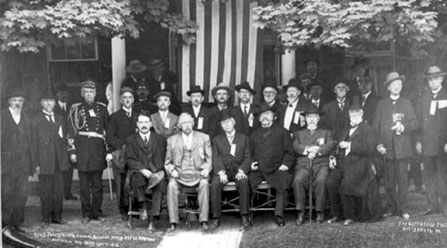One can
infer by this comment..."the misfortune to be born too late to enter into
the great struggle"...that King was proud of what he had accomplished in
the Civil War, and of what his comrades had fought to accomplish.
He was not ashamed of having fought for the cause that he believed in.
It is readily apparent that King, under other circumstances, might not
have been the type to join the army. He had a successful law practice
for himself when the war broke out, and he had just been married.
King did not want to fight in the war, rather he felt as though
he had to, in order to preserve the Republic. These views were a
result of how he had been raised, influenced by the patriotism and love
for country that he observed within his father. He saw the Civil
War as a task that had to be completed for the safety of the Union and
the preservation of the United States, and believed that the surviving
veterans, as well as the men who had died, should be properly remembered
and taken care of. King had never had much animosity toward the Southern
states, and his fight for veterans rights and memorialization included
the soldiers on both sides of the conflict. This became the agenda
that King worked toward completing during his life after the Civil War.
King's activities within
these various highly respected organizations, and the leadership positions
that he held allowed him to make connections that aided him in his involvement
with politics. Although King had always claimed to be a staunch Democrat,
stating at one point that, "where I live there is an awful Republican crowd,
and I have often been taken for a Republican, whereas I have never been
anything else than a Democrat..."46,
it seems as though most times, the issues commanded his vote rather than
the party. Especially in his later years, King often supported non-Democratic
candidates. South by a Republican Congress during the Reconstruction period.
He was of the opinion that although the southern states had indeed instituted
a damaging rebellion against the North, they had been punished enough by
the horrible consequences of the war, which created political, economic,
and social chaos in that area. King advocated a policy of Southern
assimilation back into a firm relationship with the Northern states, as
it had been previous to the war years.
been previous to the war years.
King became extremely
involved in the campaigns for various presidents that he felt strongly
about, in both the Democratic and Republican parties. He was at different
times an active and quite effective speaker for both parties. New
York Governor Grover Cleveland, a Democrat, was supported by King in both
of his successful quests for the presidency. King traveled around
the country, speaking out for Cleveland at various conferences and events
and writing articles attesting to his abilities as a politician.
There is no question that the support of a man with such respect and admiration
as King commanded was a great help in any man's campaign for a public office.
King attended Grover Cleveland's inaugural ball in 1885.47
On the other hand, King joined that "awful Republican crowd" in campaigning
for former New York governor Theodore Roosevelt on his way to the presidency
as well. When Roosevelt did not receive his party's nomination for
the presidency in the 1916 election, King conveyed his disappointment in
a newspaper interview, stating his belief that Roosevelt was the best candidate
for the job that year.48
He once wrote in one of his poems:
| So God bless Roosevelt! say we all, And honor crown his name,
And may it shine eternally, Upon the walls of fame. Its Comrade Roosevelt
now, you know, Whose heart beats firm and true, For us old boys who saved
the flag, Our loved Red, White, and Blue.49 |
King himself toyed with
the idea of becoming a politician, and in 1895 ran on the Democratic ticket
for the position of Secretary of State of New York. King lost the
election, but carried his staunchly Republican town of Brooklyn by over
7,000 votes, demonstrating his popularity there.50
King also left aside both major parties in 1896 to join the Sound Money
party as their candidate for Congress, and in 1912 to run under the Progressive
Party's ticket for the position of State Controller, but lost both elections.51
King also served ten years on the Brooklyn Board of Education.52
It was said in an article upon his death that,
organizations he became involved with, and cemented genuine friendships with powerful people, giving him important connections through which he could complete his agenda. Through various outlets that included politics, public speaking, and writing, King put his efforts following the Civil War into remembering that conflict and helping to rebuild and memorialize a broken nation.

 been previous to the war years.
been previous to the war years.